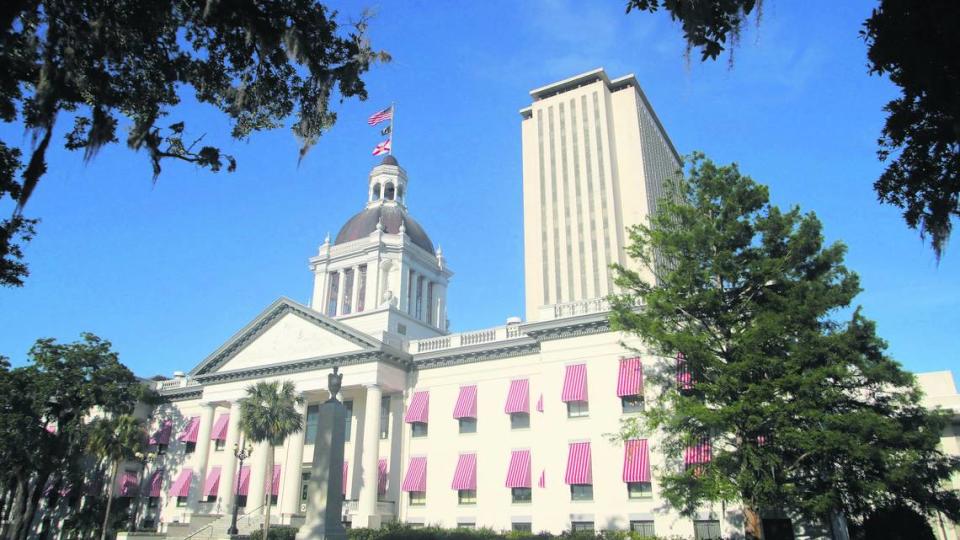Lawmakers call on state to reprimand Muslim prayer leader for anti-Jewish comments
A Muslim prayer leader who made inflammatory comments about Jews and Israel is facing intense backlash from Jewish lawmakers who want the state of Florida to revoke his dental license and strip public funding for a school owned and operated by his mosque in North Miami.
The comments made last month by Dr. Fadi Kablawi — an imam at Masjid As Sunnah An Nabawiyyah — have been referred to three state agencies, including state police, Gov. Ron DeSantis’ office confirmed on Wednesday.
Kablawi, who has a history of making controversial statements, says the pressure campaign against him is an “abuse of power” and that he intends to legally challenge any action the state takes against him.
“We will not be intimidated and we are ready to take this all the way to the Supreme Court,” Kablawi told the Miami Herald on Wednesday.
The firestorm stems from remarks Kablawi made at a religious ceremony in late April that included him saying Israeli soldiers were “worse than Nazis.” Video of Kablawi’s comments, made in Arabic, were posted online by the Middle East Media Research Institute, which included a translation that quoted Kablawi saying that he prayed to “annihilate” Jews. Critics say that the nonprofit organization, which monitors media in the Middle East, has a pro-Israel slant.
Other, less incendiary translations of Kablawi’s comments are possible. But, relying on the MEMRI translation, which has been highlighting Kablawi’s comments for years, Jewish lawmakers have called Kablawi’s remarks “unacceptable” and have called on the Florida Board of Dentistry to revoke his license to practice, arguing that his extreme remarks could pose a threat to patients.
His practice is located in Northeast Miami-Dade, which is home to a large Jewish population.
“I assume he has Jewish patients given where he practices,” state Rep. Michael Gottlieb, D-Davie, said in an interview. “How can anybody have any confidence that he is going to provide quality medical services when he is calling for the annihilation of Jews and essentially calling for a genocide?”
The Florida Board of Dentistry has been asked to consider suspending Kablawi’s license to practice. The board did not respond to requests for comment and it is unclear whether they are formally investigating the issue.
Politics & Policy in the Sunshine State
Start your week informed about Florida's issues, ideas, conflicts and curiosities. Sign up and get this free newsletter every Monday morning in your inbox.
The power of government
The complaints against Kablawi, which began with calls for him to lose his dental license, quickly ratcheted up to include Reviver Academy, the school owned and operated by the mosque. The school is eligible to receive taxpayer-funded vouchers, state records show.
In a letter to Florida Education Commissioner Manny Diaz, state Rep. Randy Fine, R-Palm Bay, claimed the school had received $500,000 in taxpayer-funded scholarships that currently benefit 74 students.
Fine called on state officials to make the school ineligible for vouchers because of Kablawi’s remarks during the religious ceremony in late April. In his letter to Diaz, Fine pointed to Kablawi’s comments to claim the school was educating “future terrorists.” Fine has been accused of making Islamophobic comments, including calling Palestinians “animals.” He says both are untrue.
The Florida Department of Education did not respond to requests for comment.
Kablawi, who declined an interview on Wednesday, suggested that politicians calling for the state to punish him and his mosque were crossing a clear line intended to protect free speech.
“This is an abuse of power and this country has a law that applies to everyone equally” he wrote in a text message, adding that he intends to get attorneys involved.
Gottlieb, however, argued that Kablawi’s comments should not be constitutionally protected because he believed they were inciting violence.
Can religious speech lead to state reprimands?
The First Amendment gives all individuals residing in the United States the right to express themselves without government interference or regulations. Additionally, the Supreme Court has said that freedom of speech should be completely protected unless it breaks laws already in place.
The Supreme Court has also rejected several government attempts to prohibit or punish hate speech.
“True threats” — or intentionally threatening someone with death or serious bodily harm — are not protected by the First Amendment, according to Caroline Mala Corbin, professor of law at the University of Miami School of Law.
“The speaker has to have a certain state of mind for his threat to be considered a true threat,” said Corbin.
But not everything that sounds threatening is a “true threat.” The court needs to consider three factors for something to be considered a “true threat” — the harm must be directed at a specific person, the speaker intended to frighten or intimidate the target, and a reasonable person would have to regard a statement as threatening. The context of the speech and the intention of the speaker are very important, Corbin said.
“These determinations are very dependent on the specific facts and circumstances,” Corbin said. “Was it actually threatening a specific person or group of people? What was the intent of the speaker? Would a reasonable person think that this was a threat?”
Another crucial distinction that many people forget, said Corbin, is that the free speech clause only limits what the government can do, not private actors.
“The free speech clause is meant to limit government censorship,” said Corbin. “It is not meant to guarantee that your speech is consequence free.”
This story has been updated to include state Rep. Randy Fine’s pushback against accusations that he is Islamophobic.
This story was produced with financial support from Trish and Dan Bell and from donors comprising the South Florida Jewish and Muslim Communities, in partnership with Journalism Funding Partners. The Miami Herald maintains full editorial control of this work.


